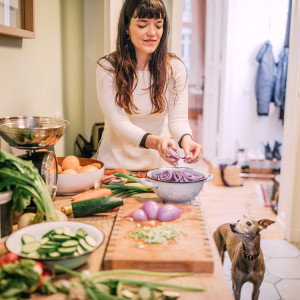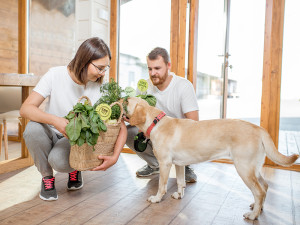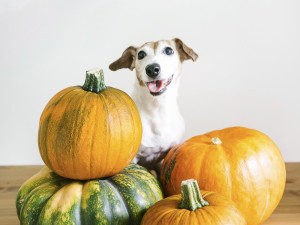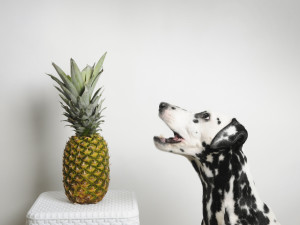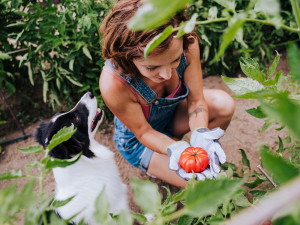
Share Article
From sweet to spicy, pickles can be dressed up nearly any way you want, making them a popular snack, appetizer, or sandwich topper. Most of us enjoy pickles so much that sharing them with our canine companions may cross your mind.
But before you purchase your dog a pickle from the giant jar at the lunch counter, you’ll want to read this. Pickles aren’t the best dog treat out there, and we’ll tell you why.
Can dogs eat pickles?
You’ll want to avoid giving your dog pickles, unless you know that all of the ingredients used in the pickling process are safe for dogs. All pickle recipes include the main ingredient, cucumbers, which are perfectly safe for dogs to eat in moderation, but the blend of spices that give pickles their unique flavor may not be safe for dogs. Even if all ingredients are dog-safe, pickles should be fed in moderation, not as part of a regular diet.
Why do some dogs like pickles?
Some dogs have a bit of a salty tooth, while others may enjoy the pleasant pickle crunch. Some dogs may want a pickle because you’re eating it. Either way, pickles shouldn’t be your go-to snack for your dog. There are plenty of other options that they will find just as tasty and with less risk involved.

Risks of feeding your dog pickles
There are a couple of main reasons why feeding your dog pickles is risky: high sodium content and potentially toxic ingredients.
High-sodium content
The pickling process involves soaking cucumbers in a brine solution that’s mainly water, vinegar, and a load of salt. This step is what helps give pickles their flavor as well as cures and preserves them.
Because salt is a major player in this step, the pickle end product also tends to be very high in sodium, something that your pup just doesn’t need. Yes, some salt in your dog’s diet is necessary, but these levels are much higher than needed and can actually be dangerous if they happen to eat too much.
Pickle ingredients that are toxic to dogs
Besides water, vinegar, and salt, several other seasonings can play a role in the pickle-making process. All of these different seasoning combinations help give pickles their distinct flavor. They can also be the main reason that pickles aren’t safe for your dog to eat. Things like onions and garlic, even the powdered versions, can be especially dangerous, potentially causing an upset stomach or destruction of red blood cells.
Are there any pickle recipes that are safe for dogs?
As long as you steer clear of the problem seasonings (onion and garlic), pickles aren’t toxic to your pup. Plain pickles can be an okay occasional snack for your dog, but they’re still going to have a lot of salt. So, if you want to make a dog-friendly pickle version in your home, leave out the onion and garlic and reduce the amount of salt as much as you can. If that doesn’t sound like your taste of pickle, don’t worry. There are many other healthier human foods that you can share with your pup.
Alternative healthy treats for dogs
Fortunately, there are a lot of healthy fruits and veggies for you to share with your dog. However, you should still talk to your veterinarian before sharing any human foods with your dog. It’s also important to wash produce thoroughly and remove any seeds, pits, or peels before feeding them to your dog. Safe foods include:
Cucumber
Green beans
Peas
Carrots
Apples
Bananas
Berries
Pumpkin
Lean, cooked meats
Some freeze-dried food
What to do if your dog eats pickles
Chances are eating one or two pickles isn’t going to cause any real issues in your dog, but you’re going to want to keep an eye on them and consult your veterinarian if something seems off. Signs such as vomiting, diarrhea, not eating, stomach pain, or lethargy all warrant a veterinary visit, especially if the pickles they ate contained onions or garlic. If you gave your dog a small bite of pickle as a snack, ensure they have plenty of water to drink for the rest of the day. If your dog helped themselves to more than a couple of pickles, seek professional help sooner rather than later. Salt toxicity and too much onion or garlic ingestion can be life-threatening for dogs.
Bottom line
Pickles without toxic seasoning aren’t toxic to dogs, but they’re also not the best treat out there. Pickles contain plenty of salt and potentially other seasonings that can be detrimental to your dog’s health. Instead of pickles, use other safe fruits and vegetables as treats.
FAQs
Can dogs eat pickled vegetables?
Pickled vegetables aren’t good for dogs. Like pickles, it�’s not about the vegetable but about the pickling process that adds salt and other seasonings that could be dangerous to your dog. Stick with fresh or plainly cooked veggies instead.
Can dogs drink pickle juice?
No, dogs shouldn’t drink pickle juice. Pickle juice is just as bad as the pickle, if not worse. It contains the salt and seasonings that pickles do and is very acidic, which can upset a dog’s stomach.
Is dill bad for dogs?
Dill contains a lot of antioxidants, vitamins and minerals that can be beneficial if fed to your dog in moderation. But when dill is fed to your dog in the form of a dill pickle, it can have the opposite effect due to the additional salt and seasonings.
Will pickles help my dog’s upset stomach?
The salt and acidity of pickles can actually make a dog’s upset stomach worse. If your dog’s stomach is upset, speak to your veterinarian.
Can dogs have dill pickle chips?
Dill pickle chips are simply dill pickles in a cutup version. They are no different nutritionally than pickles which means they can be just as harmful due to their salt and seasoning content.
References
Hayes, Cristine DVM. “Garlic and Onion (Allium spp) Toxicosis in Animals.” Merck Veterinary Manual. Sep 2024. https://www.merckvetmanual.com/toxicology/food-hazards/garlic-and-onion-allium-spp-toxicosis-in-animalsopens in new tab.
Thompson, L.J. Sodium chloride (salt). In Gupta RC, ed. Veterinary Toxicology: Basic and Clinical Principles, 3rd ed. Elsevier, 2018. 479-482. https://doi.org/10.1016/B978-0-12-811410-0.00034-9opens in new tab

Dr. Chyrle Bonk, DVM
Dr. Chyrle Bonk has been a mixed-animal veterinarian since 2010, with a special interest in rehabilitation. When she's not practicing or writing about veterinary medicine, you may find her exploring the outdoors with her family or tending to her cows, horses, chickens, or cats and dogs.
Related articles
Can Dogs Eat Pumpkin?
This superfood is delicious and full of nutrients—but how much is too much of a good thing?
Can Dogs Eat Pineapple?
Pineapple is a healthy, sweet treat for dogs—as long as you feed it to your pup in moderation.
Can Dogs Eat Cinnamon?
Just a sprinkle. Is that OK?
Can Dogs Eat Tomatoes?
Bite-size pieces of ripe, red tomatoes are safe—but you should skip the marinara sauce.
Can Dogs Eat Peas?
And why it shouldn’t be the main ingredient in their food.
![Beagle puppy dog holding a peeled carrot in its front paws sitting in the grass]()
Can Dogs Eat Carrots?
Yep—this crunchy, sweet vegetable is a great addition to your dog’s diet.

